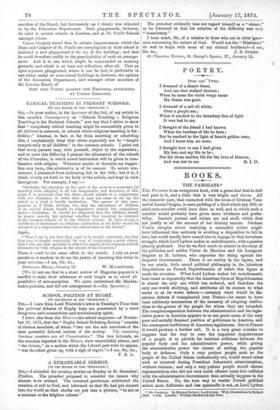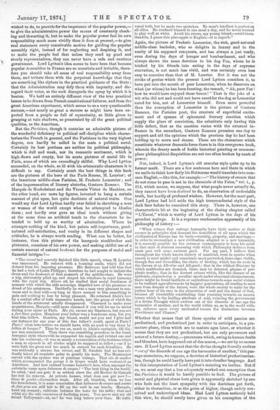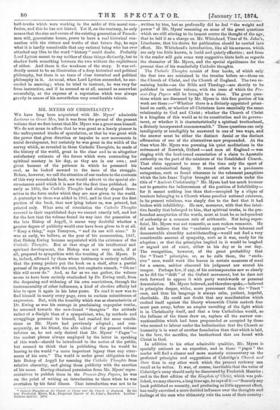BOOKS.
THE PARISIANS.*
THE Parisians is an overgrown book, with a great deal that is dull and poor in it, and a little that is very bright and clever. All the romantic part, that connected with the loves of Graham Vane and of Isaura Cicogna, is mere padding of a kind which any fifth or sixth-rate novelist could have done as well, and to which such a novelist would probably have given more vividness and proba- bility. Isaura's journal and letters are sad stuff, which does not justify at all the account of her literary success. Graham. Vane's scruples about marrying a successful writer might have influenced him seriously in avoiding a disposition to fall in love, but could hardly have caused him to engage in that herculean struggle, which Lord Lytton makes so melodramatic, with a passion already profound. Nor do we find much to admire in the story of the politician and soldier Victor de Mauleon and his bourgeois disguise as M. Lebeau, who organises the rising against the Imperial Government. There is no reality in the figure, and to our minds, little sound political philosophy in the laborious disquisitions on French Republicanism of which this figure is- made the occasion. When Lord Lytton makes his melodramatic hero insist so repeatedly that the American form of Republicanism is almost the only one which has endured, and therefore the- only one worth studying, and attributes all its success to what seems to us its worst defects — certainly what would be dis- astrous defects if transplanted into France—he seems to have been sublimely unconscious of the necessity of adapting institu- tions to the genius of the people for whom they are intended. The complete separation between the administrative and the legis- lative power in America appears to us one great cause of the very poor and socially despised position of politicians in America, and the consequent inefficiency of American legislatures. But in France- it would produce a further evil. It is a very great mistake to suppose that the way to cure the impatient impulsivenesa of a people is to provide for habitual collisions between the popular body and the administrative power, while giving the administrative power the means of setting the popular- body at defiance. Only a very patient people such as the people of the United States undoubtedly are, would stand crises such as occurred during President Johnston's administration,. without violence ; and only a very patient people would choose- representatives who did not very much oftener come into collision. with the administrative Government than actually happens in the United States. No, the true way to render French political action more deliberate and less spasmodic is not, as Lord Lytton • The Parisians. By Edward Bolivar, Lord Lydon. Willi Illustrations by Sydney Hall. 4 vole. London : William Blackwood and Sons.
swished to do, to provide for the impotence of the popular power,— 'to give the administrative power the means of constantly check- ing and thwarting it, but to make the popular power feel its own responsibility much more vividly than it does at present,—to give real statesmen every conceivable motive for guiding the popular assembly right, instead of for neglecting and despising it, and to make the people feel that unless they send up good and steady representatives, they can never have a safe and cautious government. Lord Lytton's idea seems to have been that because popular Assemblies in France are so uncertain and irritable, there- fore you should take all sense of real responsibility away from them, and irritate them with the perpetual knowledge that they are something like ciphers in the practical guidance of the State ;
that the Administration may defy them with impunity, and dis- regard their votes, as the rock disregards the spray by which it is
beaten. We hold an entirely different view of the true practical lesson to be drawn from French constitutional failures, and from the great American experiment, which seems to us a very questionable succe.se,—not nearly so great a success as might have been ex- pected from a people so full of equanimity, so little given to grasping at vain shadows, so penetrated by all the great political qualities, as the American.
But the Parisians, though it contains an admirable picture of the wonderful deficiency in political self-discipline which charac- terises the French in general, and the Parisians in the very highest -degree, can hardly be called in the main a political novel.
-Certainly its beet portions are neither its political philosophy, which is dull and weak, nor its romantic sentiment, which is high-flown and empty, but its acute pictures of social life in Pads, some of which are exceedingly skilful. Why Lord Lytton succeeded, on the whole, so ill with his aristocratic characters it is difficult to say. Certainly much the best things in this book are the pictures of the hero of the Paris Bourse, M. Loavief ; of
,the luxurious middle-class Parisian, M. Frederic Lemercier ; and -of the impersonation of literary absinthe, Gustave Barnette. The
Marquis de Rochebriant and the Vicomte Victor de Mauldon, on the other hand, are mere lay figures, invented to bang a certain Amount of plot upon, bat quite destitute of natural traits. One would say that Lord Lytton hardly ever failed in sketching a man or woman of the world except when he attempted to idealise 'them; and hardly ever gave in ideal touch without giving at the same time an artificial touch to the characters he in- tended to hold up as worthy of admiration. Where he attempts nothing of the kind, but paints self-importance, good- natured self-satisfaction, and vanity in its different shapes and Attitudes, he is always worth reading. What can be better, for instance, than this picture of the bourgeois stockbroker and plutocrat, conscious of his own power, and making skilful use of a -certain amount of natural bonhomie for the purposes of social and financial intrigue?—
"The avoue had scarcely finished this little speech, when M. Lonvier was announced. He entered with a beaming smile, which did not -detract from his imposing presence. His flatterers had told him that he had a look of Louis Philippe; therefore he had sought to imitate the -dress and the bonhomie of that monarch of the middle-class. He wore a wig, elaborately piled up, and shaped his whiskers in royal harmony with the royal wig. Above all, he studied that social frankness of manner with which the able sovereign dispelled awe of his presence or -dread of his astuteness. Decidedly he was a man very pleasant to con- -verse and to deal with—so long as there seemed to him something to -gain and nothing to lose by being pleasant. He returned Alain's bow hy a cordial offer of both expansive hands, into the grasp of which the hands of the aristocrat utterly disappeared. 'Charmed to make your acquaintance, Marquis—still more charmed if you will let me be useful during your sejour at Paris. Ma foi, excuse my bluntness, but you are -a fort beau garcon. Monsieur your father was a handsome man, but you beat him hollow. Gandrin, my friend, would not you and I give half -our fortunes for one year of this fine fellow's youth spent at Paris ? Pests! what love-letters we should have, with no need to buy them by billets de bangue 1' Thus he ran on, much to Alain's confusion, till din- ner was announced. Then there was something grandiose in the frank bourgeois style wherewith he expanded his napkin and twisted one end into his waistcoak—it was so manly a renunciation of the fashions which a man so repandu in all circles might be supposed to follow ;—as if he were both too great and too much in earnest for such frivolities. He was evidently a sincere bon vivant, and M. Gandrin had no less evi- Zently taken all requisite pains to gratify his taste. The Montrachet served with the oysters was of precious vintage. That vin de madere which accompanied the potage a la bisque would have contented an American. And how radiant became Louvier's face, when amongst the ,entrees he came upon laitance.s de carpes The best thing in the world,' he cried, and one gets it so seldom since the old Rocher de Caneale has lost its renown. At private houses, what does one get now ?— hlanc de poulet—flavotarless trash. After all, Gandrin, when we lose -the love-letters, it is some consolation that laitances de carpes and sautes de foie gras are still left to fill up the void in our hearts. Marquis, heed my counsel ; cultivate betimes the taste for the table ; that and whist are the sole resources of declining years. You never met my old friend Talleyrand—ah, no ! he was long before vont. time. Ho culti-
rated both, but he made two mistakes. No man's intellect is perfect on all sides. He confined himself to one meal a day, and he never learned to play well at whist. Avoid his errors, my young friend—avoid them. Gandrin, I guess this pine-apple is English—it is superb."
Again, the picture of Frederic Lemercier, the rich, good-natured middle-class bachelor, who so delights in luxury and in the vanity of his supposed conquests, and has always a jest ready, even during the days of hunger and bombardment, and who always shows the same devotion to his dog Fox, whom he is tricked by his friends into eating in the days of supreme - starvation, is not much less vivid, and was certainly even leas easy to conceive than that of M. Louvier. But it was not the stroke of genius which the present Lord Lytton considers it, to have put into the mouth of poor Lemercier, when he discovers on what (or whom) he has been feasting, the remark, " Ah, poor Fox ! how he would have enjoyed these bones ! " That ie the joke of a wit who did not and could not have cared for the dog as Lemercier cared for him, not of Lemercier himself. Even more powerful than the conception of Lemercier is the picture of Gustave Rameau, the Parisian poet, the creature of superficial excite- ment and of spasms of ephemeral literary emotion which supply the place of conviction, the substitute only having this little defect, that as the emotion varies with the external in- fluence in the ascendant, Gustave Rameau promises one day to support and aid the opinions which the previous day he had been holding up to scorn and shame. These are the characters which constitute whatever dramatic force there is in this overgrown book, wherein the dreary sands of feeble historical painting or common- place philosophical disquisition are not too often broken by oases of power.-
Nor, indeed, is Lord Lytton's old oracular style quite up to its former mark. There are a few sentences here and there in which we smile to think how flatly his Bulwerese would translate into com- mon English,—like this, for example:—" The history of events that do not come to pass is not in the chronicle of the Fates," vol. i., p. 212, which means, we suppose, that what people never actually do, they cannot have been destined to do, an observation of undeniable truth, but hardly of profound wisdom. However, for the most part, Lord Lytton had laid aside the high transcendental style of the dark Seer before he conceived this story. There is, however, one characteristic bit at the beginning of the closing chapter called " L'Envoi," which is worthy of Lord Lytton in the days of his grandest sayings. It is a supreme condensation apparently of his philosophy of history :—
" When crimes that outrage humanity have their motive or their excuse in principles that demand the demolition of all upon which the civilisation of Europe has its basis—worship, property, and marriage— in order to reconstruct a now civilisation adapted to a new humanity, it is scarcely possible for the serenest contemporary to keep his mind in that state of abstract reasoning with which Philosophy deduces from some past evil some existent good. For my part, I believe that throughout the whole known history of mankind, even in epochs when reason is most misled and conscience most perverted, there runs visible, though fine and threadlike, the chain of destiny, which has its roots in the throne of an All-wise and All-good ; that in the wildest illusions by which multitudes are frenzied, there may be detected gleams of pro- phetic truths ; that in the fiercest crimes which, like the disease of an epidemic, characterise a peculiar epoch under abnormal circumstances, there might be found instincts or aspirations towards some social virtues to be realised ages afterwards by happier generations, all tending to save man from despair of the future, were the whole society to unite for the joyless hoar of his race in the abjuration of soul and the denial of God, because all irresistibly establishing that yearning towards an unseen future which is the leading attribute of soul, evincing the government of a divine Thought which evolves out of the discords of one age the harmonies of another, and in the world within us, as in the world with- out, enforces upon every unclouded reason the distinction between Providence and Chance.
Whether that means that all these epochs of wild passion are predestined, and predestined just in order to anticipate, in a pre- mature phase, ideas which are to mature ages later, or whether it means that they are not predestined, but are only precursors and notes of a future destiny,—precursors which, owing to human faults and blunders, have happened out of due season,—we are by no means sure. If Lord Lytton meant that the divine thought literally evolves "out of the discords of one age the harmonies of another," this pas- sage enunciates, we suppose, a doctrine of historical predestinarian- ism, though he could hardly have put it into cloudier language. And to this interpretation of Lord Lytton's meaning we incline. But if so, we must say that a less adequately worked-out conception than the Parisians it would be hardly possible to find. The picture of moral and physical chaos here given is apparently sketched by one who feels not the least sympathy with the doctrines put forth, either in themselves, or as the germ of higher, though rudely con- ceived and undeveloped ideas. Had Lord Lytton seriously held this view, he should surely have given us his conception of the
half-truths which were working in the midst of this moral con- fusion, and this he has not hinted. Yet if, on the contrary, he only means that the sins and errors of the existing generation of French- men will, generations hence, prove to have a real historical con- nection with the virtues and truths of that future day, he says what it is hardly conceivable that any rational being who has ever attached any idea to the word " history " could doubt. Probably Lord Lytton meant to say neither of these things distinctly, but to shadow forth something between the two without the explicitness of either. And there is the weakness of the story. it was evi- dently meant to be an illustration of a deep historical and political philosophy, but there is no trace of clear historical and political philosophy in it. As usual, when Lord Lytton succeeded, he suc- ceeded in amusing ; when he tried to instruct, he was very far from instructive, and if he amused us at all, amused us somewhat mournfully, at the expense of a reputation which was always greatly in excess of his nevertheless very considerable talents.




































 Previous page
Previous page